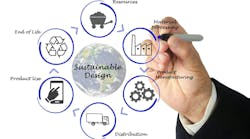As sustainable manufacturing becomes increasingly important, the demand for green-skilled workers grows—think sustainability-minded facilities managers, compliance managers, risk advisers and safety technicians.
This upskilling of sustainability skills is increasing according to a recent report from Indeed, while job postings requiring green skills grew at 8% annually since 2017. As such, micro-credentialing will be a core strategy for companies looking to train employees on the job, according to Danny King, CEO of digital-credentialing company Accredible. Such short, focused credentials designed to provide in-demand skills, know-how and experience will afford workers with the flexibility to maintain their current workload while acquiring the new skills demanded by a green economy, he says.
We wanted to learn more, so we connected with Danny to discuss big opportunities with micro-credentialing. Take a look…
Smart Industry: What is micro-credentialing? How does it differ from traditional professional credentialing?
Danny: Micro-credentials are often a form of digital credential that verifies a person’s understanding and fluency in a specific, highly-focused skill. A micro-credential can showcase workers' competency in skills that are needed in today’s workplace, such as project management, financial literacy, fluency in Adobe Creative Cloud or Microsoft Office tools. They are designed to offer a flexible and targeted way for people to develop the knowledge and skills needed for personal and professional development.
They are different from traditional digital credentialing because they are conferred after shorter-term learning and development courses, allowing for more flexible, learner-centered forms of education and training, rather than adhering to a rigid course structure. They also have the potential to offer education and training opportunities to a wider range of learners who benefit from the flexibility.
Smart Industry: How is the rapid pace of digitalization changing the working environment? How is it changing credentialing?
Danny: Digitalization significantly improves the operational efficiency for an average working environment. For credentialing specifically, digital credentials, digital badges, and digital certificates have emerged as an appealing substitute for paper-based certificates, badges and awards, making it simple to award, manage and verify those credentials, saving organizations time and money.
Additionally, the verifiable nature of digital credentials make what is otherwise a time-consuming and cumbersome verification process into an easy and automated one. In a study by Zippia of 1,000 US professionals, 30% said they had ‘bent the truth’ or lied on their resume about their skills or experience. Digital credentials simplify the verification process by offering one-click verification, saving time for HR departments, hiring managers, and others.
Smart Industry: Are sustainability standards for industry confusing? How do credentials help?
Danny: At the moment, sustainability standards are still being discussed and debated, as different industries and governments begin charting the way for the economy to transition to a greener economy. In the interim, digital credentials can help in a vital way by promoting a common standard. For instance, Scality, which provides training to their partners to certify that they can effectively deliver and sell the company’s software, shows that courses providing digital credentials encourage others to take that course.
Smart Industry: What is the correlation between upskilling and green initiatives? Are business owners in need of sustainability experts?
Danny: Upskilling will be key as the demand for green skills rises. Rising sustainability commitments across governments and businesses mean rising demand in green skills across roles other than those related directly to climate change, as sustainability standards and reporting become the new norm. For many, it could mean their jobs need certain additional sustainability-related skills.
Micro-credentialing will be a core strategy for companies looking to train employees on the new skills demanded by an economy more conscious of its climate impact.
Smart Industry: What is the benefit of training existing employees while on the job?
Danny: On-the-job training, when done correctly, can be both time efficient and cost effective. It enables companies to develop employees by leveraging the organization's internal resources, knowledge and expertise. Furthermore, learning hands-on while on the job provides a way for companies to train people specifically to their standards. It is especially valuable as it is estimated that it takes an average of three months to properly onboard new talent and get them up to speed with the organization’s way of doing things—with no guarantee that the skills they bring on board will be an exact fit. Workers who receive continuous-training opportunities are also more likely to stay as they feel that they are valued and being invested in, helping companies retain skilled talent that is the exact fit for them.
Smart Industry: What will sustainability-credentialing look like in five years? Will these roles be adopted into the larger business strategy or grow more distinct as they gain importance?
Danny: Credentials tied to sustainability will look a lot more standardized in five years, and its demand will only rise. Green skills will continue to become more required across the economy, and sustainability credentialing will be a key way to prove these skills. For instance, a sustainability credential could prove that an office manager has the right understanding to be able to procure office items and design recycling programs that meet adopted sustainability standards. Digital credentials allow individuals to prove their competence in the green skills that will inevitably be required in jobs across a green economy.



